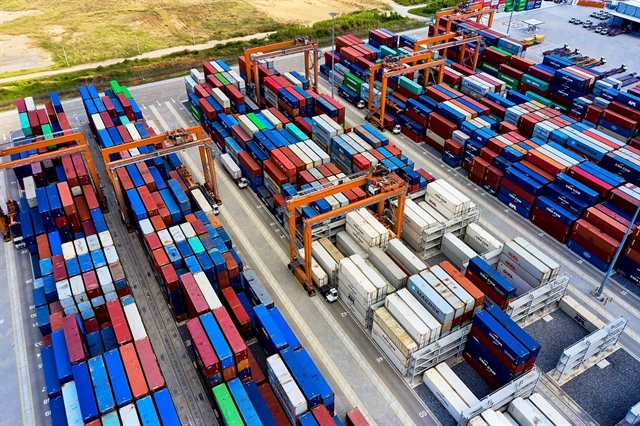Trade relations between Vietnam and India continue to flourish, with bilateral trade turnover reaching around US$15 billion in 2024.

Containers stacked at an international port in Bà Rịa-Vũng Tàu Province. — VNA/VNS Photo
Bilateral trade turnover between Vietnam and India reached around US$15 billion in 2024, marking a 4.5 per cent increase compared to 2023, according to the General Department of Vietnam Customs.
Of this total, Vietnam’s exports to India amounted to $9.06 billion, up 7.6 per cent year-on-year, while imports from India stood at $5.8 billion, down 0.6 per cent.
This reflects Vietnam’s continued trade surplus advantage in its trade relations with India, driven by the growth of key export sectors.
In the export sector mobile phones and components led the way with a turnover of nearly $1.7 billion, up 4.5 per cent, accounting for 17.5 per cent of total export value.
Computers, electronic products and components ranked second with $1.5 billion, making up 15.6 per cent of total exports.
Following these were machinery, equipment, tools and spare parts, with an export value of $947 million, representing a 9.8 per cent share. This highlights the stable demand from the Indian market for Việt Nam’s industrial products.
Notably, several other export sectors also experienced two-digit growth in 2024, including tea, timber and wood products, seafood, bamboo, rattan, sedge and carpets, rubber products, confectionery and cereals, textile fibres and textiles and garments.
Overall, Việt Nam’s exports to India are diversifying, with high-tech products and agricultural goods continuing to be key focus areas.
On the other hand, Vietnam’s imports from India during this period reached about $5.8 billion, a 0.6 per cent decrease compared to the same period in 2023.
Indian imports accounted for just 1.55 per cent of Vietnam’s total import turnover. Notably, Vietnam recorded a trade surplus of $3.2 billion with India in 2024, a 22.2 per cent increase from 2023.
Trade relations between Vietnam and India continue to flourish, playing a crucial role in bilateral cooperation with stable growth over the past 25 years. The trade structure between the two countries is highly complementary, serving as a driving force for sustainable economic cooperation. — VNS
Read original article here